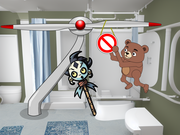to regard as / to figure / to calculate / to compute
to obtain / to get / to gain / to catch (a disease) / proper / suitable / proud / contented / to allow / to permit / ready / finished
structural particle: used after a verb (or adjective as main verb), linking it to following phrase indicating effect, degree, possibility etc
to have to / must / ought to / to need to
得
=
㝵
+
彳
:
Because Don Quixote kicked the genie's lamp from the rooftop of the Erechtheion as far as to inside of the Eiffel Tower, the genie demands Don Quixote to apologize. Inside of the Eiffel Tower, Don Quixote kowtows to the genie, who takes back the black sneakers he gave to Don Quixote earlier.
youngest / most junior / tiny / one (unambiguous spoken form when spelling out numbers, esp. on telephone or in military) / one or ace on dice or dominoes / variant of 吆[yao1], to shout
good / well / proper / good to / easy to / very / so / (suffix indicating completion or readiness) / (of two people) close / on intimate terms / (after a personal pronoun) hello
good / appropriate; proper / all right! / (before a verb) easy to / (before a verb) good to / (before an adjective for exclamatory effect) so / (verb complement indicating completion) / (of two people) close; on intimate terms / (after a personal pronoun) hello
Han ethnic group / Chinese (language) / the Han dynasty (206 BC-220 AD)

